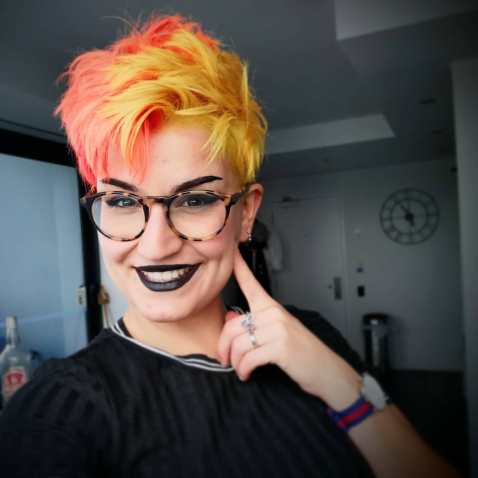Hi! Please tell us a bit about yourself… 🙂
My name is Heloise Stevance, I am originally French but moved to England when I was 18 to study astrophysics at the University of Sheffield in the North of England. I spent a year during my Master’s operating the Isaac Newton telescope in the Canary Islands as a support astronomer, and I then moved back to Sheffield for my PhD. I am now working as a Research Fellow at the University of Auckland.
What’s your field of research/What are you currently working on?
Transients! These are astronomical phenomena that last a short amount of time (on the scale of the Universe) – they are giant explosions from a whole range of shenanigans that stars can get up to. In particular, I now work on figuring out how stars become Black Holes and Neutron Stars that can merge and release Gravitational Waves and Kilonova explosions! This is a whole new field of astronomy that started with the discovery of the first black hole merger in 2015 and the first neutron star merger in 2017.
What do you love about your job?
I became a scientist because I’ve always loved learning and understanding how the world works. I am a puzzle solver and now I get to work on some of the biggest puzzles in the cosmos. I’ve also found a love for coding and computing in my PhD that continues to this day.
What struggles do you have or had to face in your career?
There are two major challenges I’ve had to face. The first one is learning to deal with failure. If you’re a curious kid you usually do well in school and never have to deal with major failure until you start doing research where things can go wrong or you may find null results even if you do everything you should. Another challenge was dealing with the ego of some of the senior academics and the inability of the system to hold them accountable for their unethical behaviour. But I’m still here boo 😉
Where do you see yourself in 5 years?
I don’t know! And that’s okay. A career in research can stop abruptly with funding or because you can’t find a position in your area. My postdoc has already brought me to the other side of the world and I’m going to go back to England in 2022. By then I might choose a different career or not be able to find a research position – but that’s okay. My coding skills, problem solving and critical thinking abilities, make me a great asset to other really interesting jobs.
Do you have any piece of advice for students aiming for a career in research?
My first piece of advice would be to learn to code in Python or R (if you are looking at research in STEM) – they are the best tools for data analysis. Ditch MATLAB. Finally I’d like to leave you with my two mottos: “You’re not dumb – science is hard” 一 don’t let imposter syndrome tell you that you’re not good enough; and “Feel the fear and do it anyway” which is more life advice than research advice but it does apply. Some of the most exciting opportunities are also the scariest. It’s normal to be scared, but don’t let that stop you.

Picture of Héloïse Stevance, Research Fellow at University of Auckland. Héloïse also took part in our Andor Technology Podcast – check it out here if you would like to hear more about her story and research :-)!!
– Thank you so much Héloïse to be part of this interview series & to join the Andor Technology podcast! It was great to ‘meet’ you and to hear about your story : ) Also, my colleague Aleks and I still talk about your cool astronomy graphics on your website!!! You rock! All the best for your future! Best, Ines